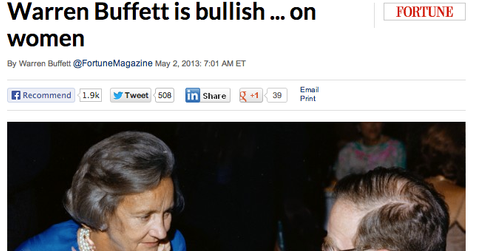Warren Buffett: Women Are A Major Reason We Will Do So Well [FORTUNE MAG]

In the flood of words written recently about women and work, one related and hugely significant point seems to me to have been neglected. It has to do with America’s future, about which — here’s a familiar opinion from me — I’m an unqualified optimist. Now entertain another opinion of mine: Women are a major reason we will do so well.
Start with the fact that our country’s progress since 1776 has been mind-blowing, like nothing the world has ever seen. Our secret sauce has been a political and economic system that unleashes human potential to an extraordinary degree. As a result Americans today enjoy an abundance of goods and services that no one could have dreamed of just a few centuries ago.
But that’s not the half of it — or, rather, it’s just about the half of it. America has forged this success while utilizing, in large part, only half of the country’s talent. For most of our history, women — whatever their abilities — have been relegated to the sidelines. Only in recent years have we begun to correct that problem.
Despite the inspiring “all men are created equal” assertion in the Declaration of Independence, male supremacy quickly became enshrined in the Constitution. In Article II, dealing with the presidency, the 39 delegates who signed the document — all men, naturally — repeatedly used male pronouns. In poker, they call that a “tell.”
Finally, 133 years later, in 1920, the U.S. softened its discrimination against women via the 19th Amendment, which gave them the right to vote. But that law scarcely budged attitudes and behaviors. In its wake, 33 men rose to the Supreme Court before Sandra Day O’Connor made the grade — 61 years after the amendment was ratified. For those of you who like numbers, the odds against that procession of males occurring by chance are more than 8 billion to one.
When people questioned the absence of female appointees, the standard reply over those 61 years was simply “no qualified candidates.” The electorate took a similar stance. When my dad was elected to Congress in 1942, only eight of his 434 colleagues were women. One lonely woman, Maine’s Margaret Chase Smith, sat in the Senate.
Resistance among the powerful is natural when change clashes with their self-interest. Business, politics, and, yes, religions provide many examples of such defensive behavior. After all, who wants to double the number of competitors for top positions?
But an even greater enemy of change may well be the ingrained attitudes of those who simply can’t imagine a world different from the one they’ve lived in. What happened in my own family provides an example. I have two sisters. The three of us were regarded, by our parents and teachers alike, as having roughly equal intelligence — and IQ tests in fact confirmed our equality. For a long time, to boot, my sisters had far greater “social” IQ than I. (No, we weren’t tested for that — but, believe me, the evidence was overwhelming.)
The moment I emerged from my mother’s womb, however, my possibilities dwarfed those of my siblings, for I was a boy! And my brainy, personable, and good-looking siblings were not. My parents would love us equally, and our teachers would give us similar grades. But at every turn my sisters would be told — more through signals than words — that success for them would be “marrying well.” I was meanwhile hearing that the world’s opportunities were there for me to seize.
So my floor became my sisters’ ceiling — and nobody thought much about ripping up that pattern until a few decades ago. Now, thank heavens, the structural barriers for women are falling.
Still an obstacle remains: Too many women continue to impose limitations on themselves, talking themselves out of achieving their potential. Here, too, I have had some firsthand experience.





